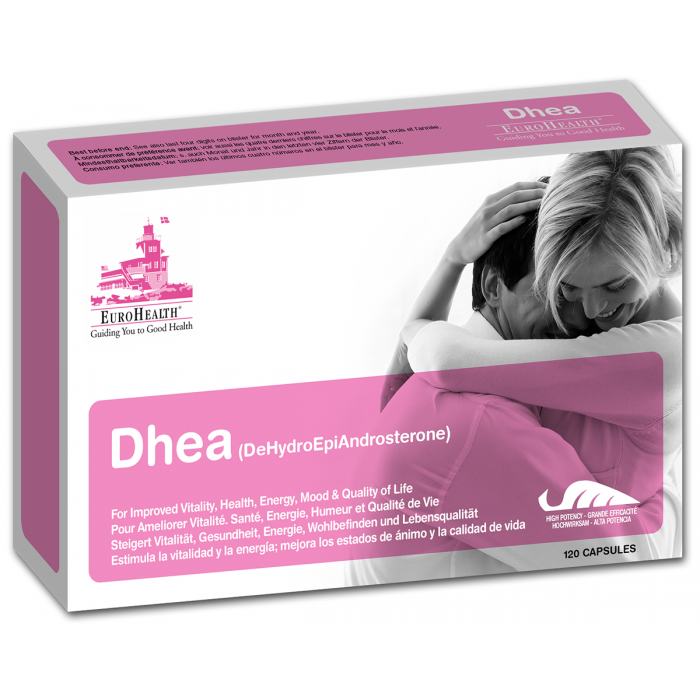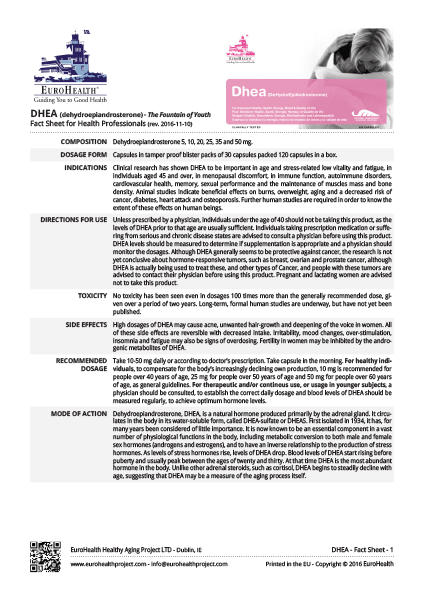We use cookies to make your experience better. To comply with the new e-Privacy directive, we need to ask for your consent to set the cookies. Learn more.
Dhea - 50mg
DHEA - DeHydroEpiAndrosterone - The Fountain of Youth.
The body's own Feeling-Good-Hormone, DHEA is naturally produced in the body, mainly by the adrenal glands. The body's natural production drops of in the mid 20's, and continues to decline with age.
Research reports show improved effects on: Energy / Vitality, Memory, Sex, the Immune System, Stress, Antioxidant properties, Heart conditions, Menopause, Autoimmune disorders, Burns, Weight loss and even on Cancer and Diabetes, and on an increased life span in general.
What is DHEA?
DHEA is a natural hormone, produced predominately by the adrenal gland. It circulates the body in its watersoluable form, called DHEA-sulfate. In the body DHEA is converted into the male and female sex hormones Androgens (e.g. Testosterone and Estrogens) and it is known to be an essential component in many physiological functions of the body. It is also well known that DHEA has an inverse relationship to the production of stress hormones, as levels of stress hormones (e.g. cortisol) rise, levels of DHEA drop, and vice-versa. A large number of vital hormones are synthesized in the body from DHEA and as such it is a part of "The Symphony of Hormones", which equals "The Symphony of Life".
About DHEA
DHEA is referred to as "The Mother Hormone", being converted in the body to a vast range of vital hormones. DHEA was first synthesized in 1934, and was for long considered to be of little importance. It is the body's most abundant hormone. Blood levels of DHEA start rising before puberty and usually peak between the ages of twenty and thirty. Unlike many other hormones, e.g. the stress hormone cortisol, DHEA-levels then begin to decline sharply with age, suggesting that DHEA- levels are one indication/marker of the aging-process itself. Already by the age of 50, DHEA-levels are very often less than half of the optimal levels. Also levels of enzymes, converting hormones "downstream", seem to be declining sharply with age, further depriving the body of vital hormones, negatively affecting the aging process. Healthy individuals normally seem to have noticeably higher levels of DHEA than their not-so-healthy counterparts. More than 5.000 research reports have been published to date on DHEA, in conjunction with a healthy aging process. In several clinical studies, DHEA has proven to be a "natural Viagra", increasing the libido, vitality, sex drive and potency in men - and even more so in women. Supplemental DHEA is not negatively affecting the body's own ability to produce DHEA, lacking a "hormone feed-back-loop". One of DHEA's main functions is to maintain a strong, effective and youthful immune system, the body thereby showing less susceptibility to disease, thus slowing down the aging process.
What does DHEA do?
Clinical research has shown DHEA to be important in age and stress-related low vitality and fatigue, in individuals aged 45 and over, in reducing menopausal discomfort, in promoting a strong immune function, in protecting against autoimmune disorders, in enhancing and improving cardiovascular health, memory, sexual performance, sleep quality and in the maintenance of muscle mass and bone density. Animal studies indicate beneficial effects on burns, overweight, aging and a decreased risk of cancer, diabetes, heart attack and osteoporosis, all promoting an increased life span. Further human studies are required in order to know the exact extent of these effects on human beings.
What are the Benefits of Supplemental DHEA?
- Energy
DHEA seems to reverse the downward spiral of aging by helping the body to regain more youthful energy. DHEA has shown in clinic studies to be a fatigue fighter, increasing the perceived physical and physiological well-being for both men and women taking DHEA, compared to the placebo. They also reported increased energy, better sleep, better ability to handle stress and no side effects. - Memory
In studies supplemental DHEA brought improvement in memory and a significant relief from depression. Currently two larger studies are being conducted to determine whether DHEA can effect the outcome of Alzheimer's disease. - Sex
In both men and women DHEA is converted into testosterone, which is known to enhance libido in both sexes. DHEA's effect on male sexual funtion has been well documented - it was found that DHEA shows consistent correlation with impotence. As DHEA levels declined, the incidence of impotence increased. It is possible that the mood and energy-enhancing effects of DHEA may be just as important as the hormonal effects. Recent studies indicate, that DHEA may actually be a "Natural Viagra" for women (September, 2000). Backed by scientific reports and clinical results, Professor Bolieux from France, has strongly confirmed DHEA's very important role and beneficial effects as a "Superhormone". - Immune system and stress
Research is suggesting that the condition of our immune system is a reflection of how well or how poorly we are aging. As we age and our DHEA levels decline, we become more susceptible to the harmful effects of corticosteroids, the stress hormones, which are inhibitors of the immune response. One of the main functions of DHEA, seems to be the maintenance of a strong and youthful immune system, by buffering or antagonizing the action of corticosteroids. - Antioxidant properties
There are good reasons to believe that DHEA is a powerful antioxidant. It appears to prevent the formation of free radicals, by disarming NADPH, a body substance that is known to generate free radicals and convert dormant carcinogens into active ones. - Heart
Several studies have indicated that higher levels of DHEA protect against heart disease, the mechanisms of which may be a combination of the prevention of excess blood clot formation, the lowering of blood cholesterol (DHL), the decrease of insulin resistance and the reduction of free radical formation. - Menopause
After menopause, when the ovaries stop making estrogen, small amounts of estrogen continue to be manufactured in the adrenal glands by DHEA, which is a precursor to estrogen. Supplementation with DHEA in post-menopausal women, therefore, appears to be a way of increasing estrogen levels naturally. In Europe DHEA has been used for more than fifteen years to treat menopause-related discomfort, such as depression and hot flashes. Several clinical studies of DHEA's potential as a substitute for Estrogen/Hormone Replacement Therapy ("ERT/HRT") have shown positive results. Preliminary findings indicate that DHEA offers many of the same benefits as estrogen replacement without the harmful side effects, such as:
- Reduction of insulin, glucose and cholesterol levels in the blood, suggesting protection for heart disease.
- A marked increase in bone density, particularly in the hip and spinal area, indicating reduction of osteoporosis. - Autoimmune disorders
In clinical trials DHEA has shown to be effective in treating Systemic Lupus Erythematosus (SLE). - Burns
DHEA also seems to have a valuable potential in the healing of burns. The risk of infections associated with burns, is not only due to the open skin, but also to a negative impact on the immune system, because of an extremely high level of stress hormones secreted in connection with the burn. If DHEA is given within three to four hours, the burn heals faster. - Weight-loss
In animal studies, DHEA appears to be an appetite suppressant, changing the food preference, potentially blocking the formation of acids that are stored as fat in the body. Minimal effect on obesity in humans has been seen so far. For DHEA to be used as a human weight reduction tool, it would have to be effective in lower doses. - Cancer, diabetes and increased lifespan
Several animal studies have indicated that administration of DHEA may be beneficial in preventing cancer and diabetes and increasing lifespan, but the relevance to humans is still clinically unproven.
Regardless of to what extent DHEA lengthens the lifespan, it is evident that it does have some important therapeutic applications, and used wisely, it may improve the quality of life and postpone some signs of aging.
DHEA is Safe to Use
No serious side effects or risks have been reported in association with taking supplemental DHEA in recommended doses (see below). Neither has any toxicity been seen even in dosages several times greater than the generally recommended dosages, given over a long period of time. DHEA seems to be compatible with - and causes no negative (drug-)reactions whatsoever - all and any prescription drug, other dietary supplement, natural products and foods, when taken in recommended dosages.
DHEA and Pregnenolone in combination
Although Pregnenolone is a precursor to Progesterone and DHEA, which in turns is a precursor to several other hormones, e.g. all of our sex hormones (Testosterone, Estrogen, only to name a few), it is important to understand, that the conversion rate of Pregnenolone to these hormones is slowed down even more with age, than the actual production in the body of these hormones themselves. When we age, the enzymes secreted by the body governing the conversion of Pregnenolone to DHEA, is secreted at an even slower rate, than the applicable hormone secretions themselves. Therefore a "Hormone Cocktail"/a mix of these hormones is preferable, as we age. Both Pregnenolone (mainly for "its own" function as Pregnenolone - memory/mental alertness, mood/well-being, arthritis and for nerve/spine cell stimulation/regeneration) and DHEA (for its many well known important and beneficial physiological functions) can - and in most cases should - be taken together in recommended dosages.
What is the recommended Intake?
Unless otherwise prescribed by a physician, only individuals over the age of 40 should be taking this product, as the levels of DHEA prior to that age are usually sufficient. Take 10-50 mg daily, or according to doctor's prescription. Take capsule in the morning on an empty stomach. For long-term continuous usage, a physician should be consulted, to establish the correct daily dosage. For healthy adults, 10 mg is recommended for people of 40 years of age, 25 mg for people over 50 years of age and 50 mg for people over 60 years of age, as general guidelines. For therapeutic usage, blood levels of DHEA should be measured regularly - especially in younger subjects - to determine if supplementation is appropriate and a physician should monitor the dosages and achieved hormone levels.
| Quantity | 120 caps |
|---|---|
| Dosage | 50 mg |
| Country of origin | Sweden |


